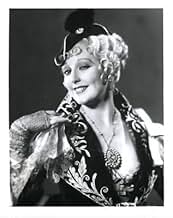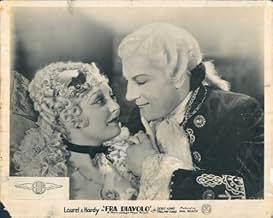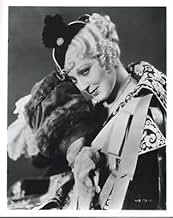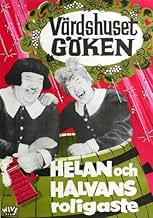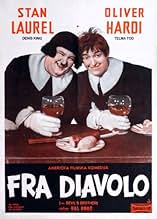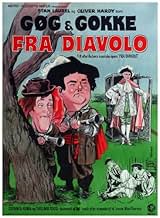Due aspiranti banditi si uniscono al servizio di un affascinante nobile, che segretamente si traveste da Fra Diavolo, un famigerato fuorilegge.Due aspiranti banditi si uniscono al servizio di un affascinante nobile, che segretamente si traveste da Fra Diavolo, un famigerato fuorilegge.Due aspiranti banditi si uniscono al servizio di un affascinante nobile, che segretamente si traveste da Fra Diavolo, un famigerato fuorilegge.
- Regia
- Sceneggiatura
- Star
- Premi
- 1 vittoria in totale
- Rita
- (as Nena Quartaro)
- Tavern Bartender
- (non citato nei titoli originali)
- Hag in Tavern
- (non citato nei titoli originali)
- Undetermined Secondary Role
- (non citato nei titoli originali)
- Bandit
- (non citato nei titoli originali)
- …
- Tavern Patron
- (non citato nei titoli originali)
Recensioni in evidenza
The plot stays fairly close to the operetta in most major details, but adds genius bits of comic business for Stan & Ollie. The catchiest tune in the original, the "Romanze" (or Diablo's theme) is retained and used as a center piece for some of the funniest bits in the show.
For those who can appreciate Stan Laurel's sublime comedic genius (he was the brains and creative force of the duo), I can't recommend this highly enough.
Laurel and Hardy offer a lot of comic relief to this Americanized version of the Auber operetta; although the music is used throughout the movie, there's little in the way of actual singing until halfway through. Mostly it's an excuse for Laurel and Hardy to offer a lot of comic relief Stanley provides most of the gags, including his disconcerting nimbleness, while Ollie is his perpetually disconcerted straight man and unconscious accomplice. The singing, what there is of it, is good. Miss Todd is gorgeous, although she doesn't get much to do. With the Boys to while away the time, who cares?
The actual opera by Auber is more dramatic than this comedy. Fra Diavola dies at the end (he is, after all, a villain). But here there is a light hearted element that overcomes the original. Stan and Ollie (or Stanlio and Ollio) are robbed by brigands on the road and decide to turn brigand themselves. Naturally, Ollie decides that he will protect them from discovery by claiming to be the infamous Fra Diavalo. Their initial attempt at theft is hardly successful. They confront a man with a hard luck story, and end up giving him money. Then they seem to be more successful confronting a younger man, until Ollie brags that he is Fra Diavolo. The younger man demands proof. Diavolo always sings a theme song, and everyone knows his voice. Ollie starts singing the tune, and the man (you've guessed it - it's Dennis King) continues singing it. They almost get hanged for that, but King decides to use them as minions in a plot to rob an English mi-lord and his wife (James Finlayson and Thelma Todd*).
(*Finlayson's name, as a joke, is Lord Rocburg. In reality, the character in the opera was Lord Cockburn.)
The bulk of the film deals with King and the boys in the inn run by Henry Armetta, where Finlayson and Todd are residing on their trip. King is romancing the frivolous and bored Todd, and hoping to get her jewelry. Finlayson is suspicious of her activities, but is not swift enough to catch King in action (at one point, he is mistaken for King by Ollie and Stan, who lock him up after beating him, and start telling him off - they think of course he's King, who listens to them annoyed but amused).
The music is actually not overdone, and King (who had a fine trained voice) gets several opportunities to sing. He was not the first major Broadway star to work with the boys (Lawrence Tibbett had in ROGUE SONG) nor the last headliner to do so (Dante the Magician would in A-HAUNTING WE WILL GO). But he seems to work quite nicely with them, sharing screen time, and even showing elements of comic timing and reactions. In one song number, he even shudders and turns away from an ugly woman while addressing a romantic passage in the tune.
For an early example of their use of operetta, THE DEVIL'S BROTHER is (as Stan Laurel said) one of their best films. Of course, to most people, it will always be recalled as the film where Stan drives both Ollie and Henry Armetta to distraction with his "finger wiggle" and his "earsie - eyesie - nosie" games that he can handle with ease but the other two can't quite coordinate. It is fun to watch here, and would later be subject to a rare repeat comment: in BABES IN TOYLAND, when Ollie insists that anything Stan can do Ollie can, Stan smiles and shakes his head. He then does "earsie - eyesie - nosie", much to Ollie's annoyance.
Lo sapevi?
- QuizIn this movie, Stan Laurel and Oliver Hardy are named respectively "Stanlio" and "Ollio". These are the names by which they are still known in Italy.
- BlooperPosition of the noose during the hanging sequence.
- Citazioni
Ollio: Now we've got to start all over again - right at the bottom!
Stanlio: Why don't we start at the top?
Ollio: Whaddaya mean?
Stanlio: Well, why don't we become bandits? Then we wouldn't have to work hard anymore. Let's get it the easy way. We could rob the rich and give them to the poor, and we could have all...
Ollio: [Interrupting him] That's the first time you've shown any intelligence.
Stanlio: Well, it's the first time you've listened to me. You know if you listened to me, in a while you'd be a lot better off.
Ollio: I guess you're right. Tell me that plan again.
Stanlio: [Bewildered] All of it?
Ollio: Certainly, certainly!
Stanlio: Well, if we became rich and we robbed the poor and gave them to the bandits and... we could start at the top, and we'd get to the bottom without working hard anymore. We can't go wrong. It's the law of conversation.
Ollio: What do you mean?
Stanlio: Well, as ye cast your bread on the waters, so shall ye reap.
Ollio: That's very well thought out!
- Curiosità sui creditiThe credits are listed on a scroll at the beginning of the movie. All the performers appear to have signed their own names to the list.
- Versioni alternative"Cry Babies", "Easy Come, Easy Go" and "In Trouble" were shortened edited versions created specifically for TV.
- ConnessioniFeatured in Sodankylä ikuisesti: Valon draama (2010)
- Colonne sonoreFra Diabolo
(1830) (uncredited)
Music by Daniel-François Auber from his comic opera
Libretto by Eugène Scribe
Excerpts and arias Played and Sung throughout the movie
I più visti
- How long is The Devil's Brother?Powered by Alexa
Dettagli
- Data di uscita
- Paese di origine
- Sito ufficiale
- Lingua
- Celebre anche come
- Bogus Bandits
- Luoghi delle riprese
- Azienda produttrice
- Vedi altri crediti dell’azienda su IMDbPro
- Tempo di esecuzione1 ora 30 minuti
- Colore
- Proporzioni
- 1.37 : 1
Contribuisci a questa pagina


